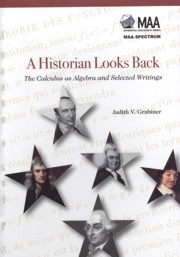
-
The digital format of this book is no longer available to purchase from Cambridge Core. Other formats may be available.
-
Select format
-
- Publisher:
- Mathematical Association of America
- Publication date:
- Invalid date
- September 2010
- ISBN:
- 9780883855720
- Dimensions:
- Weight & Pages:
- 00kg,
- Dimensions:
- Weight & Pages:
- Subjects:
- Mathematics (general), Mathematics
- Series:
- Spectrum
You may already have access via personal or institutional login- Subjects:
- Mathematics (general), Mathematics
- Series:
- Spectrum
Book description
Judith Grabiner, the author of A Historian Looks Back, has long been interested in investigating what mathematicians actually do, and how mathematics actually has developed. She addresses the results of her investigations not principally to other historians, but to mathematicians and teachers of mathematics. This book brings together much of what she has had to say to this audience. The centerpiece of the book is The Calculus as Algebra: J.-L. Lagrange, 1736-1813. The book describes the achievements, setbacks, and influence of Lagrange's pioneering attempt to reduce the calculus to algebra. Nine additional articles round out the book describing the history of the derivative; the origin of delta-epsilon proofs; Descartes and problem solving; the contrast between the calculus of Newton and Maclaurin, and that of Lagrange; Maclaurin's way of doing mathematics and science and his surprisingly important influence; some widely held 'myths' about the history of mathematics; Lagrange's attempt to prove Euclid's parallel postulate; and the central role that mathematics has played throughout the history of western civilization.
Contents
Metrics
Full text views
Full text views help Loading metrics...
Loading metrics...
* Views captured on Cambridge Core between #date#. This data will be updated every 24 hours.
Usage data cannot currently be displayed.
Accessibility standard: Unknown
Why this information is here
This section outlines the accessibility features of this content - including support for screen readers, full keyboard navigation and high-contrast display options. This may not be relevant for you.
Accessibility Information
Accessibility compliance for the PDF of this book is currently unknown and may be updated in the future.


